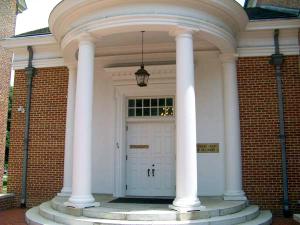Rehoboth couple takes pool case to state Supreme Court
The Delaware Supreme Court is set to rule on the case of a Rehoboth Beach couple who claims the city violated its charter by denying them the ability to build a pool.
The court will rule Wednesday, Aug. 16 on the case of Barry and Sharon Covington, who, in summer 2015, sought to build a pool at their house. The denial of that permit by multiple bodies - including the city’s board of adjustment and Delaware Superior Court - has led to the case now being decided by the state’s highest court.
In July 2015, the Rehoboth commissioners passed an ordinance that changed the zoning code and was intended to shrink the size of houses, particularly houses with swimming pools, in response to complaints about large rental houses with swimming pools. In August, a petition drive was launched, led by attorney Gene Lawson, to seek to have the zoning ordinance reconsidered or sent to referendum. The Covingtons were one of the signers of the petition.
The commissioners declined to reconsider the ordinance and the matter was put to referendum in November, where the ordinance was upheld.
Lawson, representing the Covingtons in their case against the city, argues that the charter says when the ordinance went to referendum, it was suspended without effect. The Covingtons filed for a building permit for a pool in October 2015, and should have been reviewed under the old zoning ordinance, Lawson argued. However, the city building inspector denied the permit, saying the Covingtons’ application was in violation of the zoning code.
The Covingtons then took their case to the board of adjustment, which denied their request to overturn the building inspector’s decision, on the grounds that what the Covingtons were arguing was outside the purview of the board.
Having exhausted their remedies with the city, the Covingtons then took the matter to Delaware Superior Court, where their appeal was denied. The court agreed with the city’s stance that the ordinance was pending legislation and thus had the force of law, even while suspended. The court ruled because the ordinance was subject to referendum, where it could be upheld, it was, in effect, pending legislation. However, the court also denied the board’s motion to dismiss the case outright.
In his legal briefs before the Supreme Court, Lawson argued the charter says the ordinance was suspended and could not be enforced. In its reply, the city argued the ordinance was voted upon and adopted, and was only pending further validation through referendum.
“The Covingtons’ arguments to the contrary are nothing more than an attempt to circumvent the laws put in place for the benefit of their neighbors, and for the protection of the welfare of the entire city,” the city’s brief said.
The Covingtons are asking for the Superior Court’s decision to be reversed and for the board’s motion to dismiss to be denied. No oral arguments will be heard in the case, which will be decided on the legal briefs.
Ryan Mavity covers Milton and the court system. He is married to Rachel Swick Mavity and has two kids, Alex and Jane. Ryan started with the Cape Gazette all the way back in February 2007, previously covering the City of Rehoboth Beach. A native of Easton, Md. and graduate of Towson University, Ryan enjoys watching the Baltimore Ravens, Washington Capitals and Baltimore Orioles in his spare time.



















































